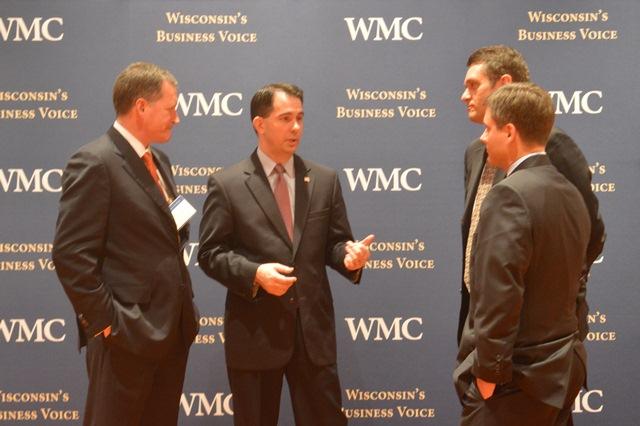Budget Has Millions in Tax Breaks
Breaks go to special interest groups who donated $10.2 million to Walker.

Governor Walker delivers remarks at Wisconsin Manufacturers and Commerce’s Business Day in Madison, 2013. Photo from the State of Wisconsin.
Republican Gov. Scott Walker’s proposed 2017-19 state budget contains millions of dollars in lower fees and taxes for business, construction, agriculture, health care and utility interests, which contributed $10.2 million to his campaign over the past five years.
The tax breaks and exemptions total $26.3 million over the two years of the biennial budget. Add to that $6.3 million in grants certain businesses will receive. All must also be approved during the GOP-controlled legislature’s consideration of the budget in the coming months. Here is a list of the tax breaks and grants:
Increasing the angel and early stage investment tax credits by $5.4 million over two years for certain new businesses;
Creating a $2 million sales tax exemption over two years for certain retailers for prepared food made off-site, frozen and then sold;
Increasing the current sales tax exemption for lump-sum construction contracts by $2.75 million over two years so it applies to all construction contracts and subcontractors;
Repealing the ambulatory surgical center assessment, which is used to partially fund the Medical Assistance program, saving medical centers and hospitals $5 million annually;
Effectively reducing agricultural pesticide application licenses and commercial feed surcharges by about $4.5 million over the next two years;
Repealing the state’s stray voltage program, which will save certain electric utilities about $850,000 a year in fees to fund it. The program identifies and resolves electricity problems on farms that affect livestock and milk production.
Campaign Cash
-
Outside Groups Spent Record $28.8 Million on State Supreme Court Race
 May 7th, 2023 by Erik Gunn
May 7th, 2023 by Erik Gunn
-
Top 20 Donors to State Political Parties
 Apr 4th, 2023 by Peter Cameron and Hina Suzuki
Apr 4th, 2023 by Peter Cameron and Hina Suzuki
-
$38 Million Spent on High Court Race
 Mar 29th, 2023 by Erik Gunn
Mar 29th, 2023 by Erik Gunn





















Good, lets grow those businesses for jobs. Down south they have all kinds of deals to get our businesses down there and that is why we have been losing. Kimberly Clark anyone???
From ThinkProgress.org Jan. 30, 2016 “Walker Thought His Tax Break Would…”:
“In 2011, the same year Scott Walker became governor — Wisconsin enacted a Manufacturing and Agriculture Credit (MAC) meant to stimulate the state economy by providing tax relief for those who use property for productive purposes. A new study indicates it’s providing lots of tax relief for the rich but not much economic stimulus for anybody else.
The Wisconsin Budget Project study finds that MAC is taking a much greater toll on the state budget than lawmakers envisioned. Though it was initially estimated that the credit would reduce tax collections by $129 million in fiscal year 2017, the Wisconsin Department of Revenue now estimates it’ll cost $284 million next year. That’s roughly $30 million more than the amount Walker and the Republican-controlled legislature cut from the University of Wisconsin System in 2015.
The study also finds that MAC disproportionately benefits the rich and has had a negligible impact on job creation. Tax filers who make $1 million or more received 78 percent of the total credit amount this year, while those who make less than $300,000 got just seven percent. In return for that massive tax giveaway to the wealthy, Wisconsin’s manufacturing sector, which receives five out of every six MAC dollars, has actually shrunk relative to the rest of the state’s economy.
And Wisconsin’s manufacturing sector hasn’t grown significantly relative to the rest of the country either. In the five years since MAC was implemented, Wisconsin has ranked 25th among the 50 states in manufacturing sector job growth.
Furthermore, the Wisconsin Budget Project study points out that a claimant need not create jobs to qualify for MAC tax breaks. As long as they’re using property productively, a claimant could lay off workers or shift operations to other states and still qualify for relief.
Jason Culotta, senior director of government relations for Wisconsin Manufacturers & Commerce, argues that the 34,000 manufacturing jobs created in the state since 2011 is evidence MAC is working. But Wisconsin Budget Project analyst Tamarine Cornelius counters that the numbers suggest the same amount of jobs might’ve been created without the massive tax giveaway.
“We’re pretty close to the national average (for manufacturing job growth) before the credit and we’re pretty close the national average after the credit,” Cornelius said, according to a Wisconsin Public Radio report. “What are we getting for this very large tax credit, that’s mostly going to the pockets of not just the wealthy but the very, very wealthy, if not jobs? What is the benefit to the rest of Wisconsin?”
This isn’t the first time Walker has generated negative headlines for providing tax subsidies for job creation, a tactic that multiple studies have shown is counterproductive.
Last year, Wisconsin’s non-partisan Legislative Audit Bureau issued a damning report about the Wisconsin Economic Development Corporation, a job creation agency set up by Walker. The report found that the agency, which provides taxpayer dollars to private corporations to help them create jobs, failed to follow up on whether the companies were actually using the funds for job creation, gave loans and tax credits to companies that did not meet its requirements, and didn’t even attempt to fact-check claims by the companies about the number of jobs they created, among other problems.”
From ThinkProgress Jan.30, 2016 “Walker Thought His Tax Break Would…”:
In 2011 — the same year Scott Walker became governor — Wisconsin enacted a Manufacturing and Agriculture Credit (MAC) meant to stimulate the state economy by providing tax relief for those who use property for productive purposes. A new study indicates it’s providing lots of tax relief for the rich but not much economic stimulus for anybody else.
The Wisconsin Budget Project study finds that MAC is taking a much greater toll on the state budget than lawmakers envisioned. Though it was initially estimated that the credit would reduce tax collections by $129 million in fiscal year 2017, the Wisconsin Department of Revenue now estimates it’ll cost $284 million next year. That’s roughly $30 million more than the amount Walker and the Republican-controlled legislature cut from the University of Wisconsin System in 2015.
The study also finds that MAC disproportionately benefits the rich and has had a negligible impact on job creation. Tax filers who make $1 million or more received 78 percent of the total credit amount this year, while those who make less than $300,000 got just seven percent. In return for that massive tax giveaway to the wealthy, Wisconsin’s manufacturing sector, which receives five out of every six MAC dollars, has actually shrunk relative to the rest of the state’s economy.
And Wisconsin’s manufacturing sector hasn’t grown significantly relative to the rest of the country either. In the five years since MAC was implemented, Wisconsin has ranked 25th among the 50 states in manufacturing sector job growth.
Furthermore, the Wisconsin Budget Project study points out that a claimant need not create jobs to qualify for MAC tax breaks. As long as they’re using property productively, a claimant could lay off workers or shift operations to other states and still qualify for relief.
Jason Culotta, senior director of government relations for Wisconsin Manufacturers & Commerce, argues that the 34,000 manufacturing jobs created in the state since 2011 is evidence MAC is working. But Wisconsin Budget Project analyst Tamarine Cornelius counters that the numbers suggest the same amount of jobs might’ve been created without the massive tax giveaway.
“We’re pretty close to the national average (for manufacturing job growth) before the credit and we’re pretty close the national average after the credit,” Cornelius said, according to a Wisconsin Public Radio report. “What are we getting for this very large tax credit, that’s mostly going to the pockets of not just the wealthy but the very, very wealthy, if not jobs? What is the benefit to the rest of Wisconsin?”
This isn’t the first time Walker has generated negative headlines for providing tax subsidies for job creation, a tactic that multiple studies have shown is counterproductive.
Last year, Wisconsin’s non-partisan Legislative Audit Bureau issued a damning report about the Wisconsin Economic Development Corporation, a job creation agency set up by Walker. The report found that the agency, which provides taxpayer dollars to private corporations to help them create jobs, failed to follow up on whether the companies were actually using the funds for job creation, gave loans and tax credits to companies that did not meet its requirements, and didn’t even attempt to fact-check claims by the companies about the number of jobs they created, among other problems.
Let us get rid off all personal and corporate deductions and credits as well as the Homestead act.